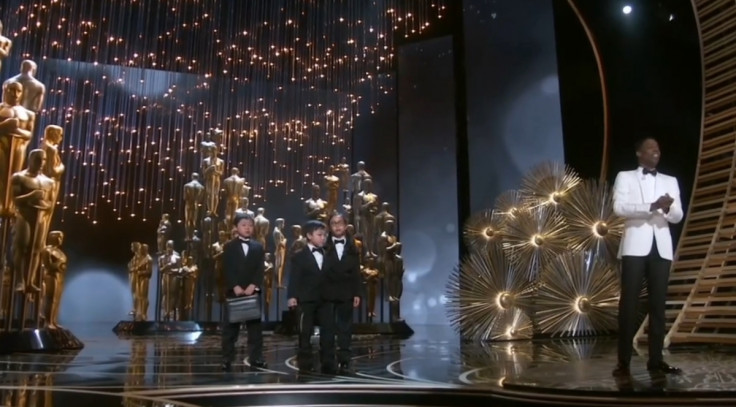Whether it's Chris Rock's Asian joke or a black MP labelled a cleaner, stereotypes matter

Unless you've been living in a cave, you'll be aware of the diversity scandal surrounding the Oscars ceremony this year. Host Chris Rock tackled it head on with a series of unflinching, close to the bone jokes about Hollywood's racism, even welcoming guests to the "white people's choice awards". It came as a surprise, then, when Rock himself indulged in a spot of racial stereotyping. He introduced three "accountants", actually three children of East Asian origin, in an apparent joke about Asian Americans being good at maths.
"If anybody is upset about that joke, just tweet about it on your phone, which was also made by these kids," Rock said, which critics have interpreted as a joke about child labour in Asia. Actress Constance Wu tweeted that the skit was "reductive and gross", while Mee Moua, head of the group Asian Americans Advancing Justice, said that the joke "played off more than one damaging stereotype of Asians and Asian Americans".
In a social media culture where everyone is outraged all the time, it would be easy to write this off as another storm in a teacup. But the controversy addresses the prevalence of racial stereotyping and the damage this can do. Stereotypes matter.
People make assumptions about other people based on their race – along with other factors, like age, class and gender – all the time. Numerous academic studies have been done on the prevalence of unconscious bias, whereby someone who might not consciously say "I dislike people of a different race to me" might, without knowing it, discriminate against people of other races, or give preferential treatment to people of their own race.
If you're curious about your own unconscious bias, Harvard University has a test on its website that you can take for free. Many people balk at the suggestion they are racist – but unconscious bias is just that, unconscious. We can't easily counter it without being aware of it, which is why NHS services in the UK and some police forces in the US run training on the issue.
The idea that you don't necessarily have to be a bad person to perpetrate prejudice unconsciously is hugely important if there is to be any kind of positive change
Such biases have a symbiotic relationship with commonly repeated racial stereotypes. The prevalence of stereotypes in society, both positive and negative – that Asian Americans are nerdy and socially awkward, that black people are good at sports but prone to criminality – feed into all sorts of real biases, both unconscious and conscious. The conviction that people of different races are somehow fundamentally different from you, even if you're not fully aware of that belief, gives such stereotypes extra weight, even when they are patently ridiculous.
Ironically, this was something that Rock addressed on Oscars night. He said that the racism of Hollywood was not "burning cross racist ... it's a different type of racist". He said that white people in showbiz "don't hire black people and they're the nicest white people on earth; they're liberals." He added that this prejudice is "sorority racist, like 'We like you, Rhonda, but you're not a Kappa.'"
This is a pervasive issue that goes way beyond Hollywood. This week, the black British MP Dawn Butler told of an incident in the Houses of Parliament; she was in a members-only lift when an unnamed Commons member told her: "This lift really isn't for cleaners."
The comment is obviously offensive and exclusionary for a whole number of reasons, and a whole host of biases, based on class, race and gender, are all evident. Beyond that, it illustrates that some people – ethnic minorities, women – frequently start from the position of having to disprove negative assumptions about them, no matter how high powered they have become. It also risks reinforcing a sense among others from these groups that there is simply too far to travel to counter the weight of these assumptions.
Ethnic minorities frequently start from the position of having to disprove negative assumptions about them
The idea that you don't necessarily have to be a bad person to perpetrate prejudice unconsciously is hugely important if there is to be any kind of positive change. When people applying for universities and jobs are disadvantaged because their names give away the fact that they are from an ethnic minority background, this is clearly something we need to worry about. Last autumn, it was announced that the university applications service Ucas, along with numerous graduate employers, would enforce "name-blind" applications to counter this very problem.
You could argue that discrimination by employers and educational institutions – unconscious or otherwise – is far removed from a stupid joke based on a racial stereotype at a glitzy awards ceremony. But these issues exist on a continuum. The thread running through society that starts as a joke made on the basis of racial difference can end up with someone not being called for an audition that doesn't conform to stereotype, or a job application being inexplicably overlooked. That matters just as much in politics and all other areas of life as it does in Hollywood.
© Copyright IBTimes 2025. All rights reserved.






















